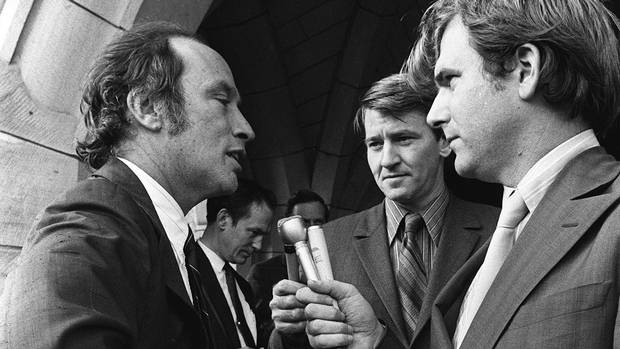It remains to be seen what Prime Minister Stephen Harper will do with his new “anti-terror legislation,” announced in the emotional aftermath of the shooting on Parliament Hill as the story of the murderous rampage in Paris was still unfolding.
My guess is Harper himself doesn’t fully know yet because the legislation is likely still to be stitched together from a surveillance state wish list concocted by various players in the security services, the corporate sector and the political executive. So the bill, which has probably been coming together since December’s attack by a lone man with a lever-action hunting rifle in Ottawa, is probably not quite complete.
Care will need to be taken by the drafters to ensure provisions designed to intimidate and spy on designated enemies of the Conservative Party of Canada, environmentalists or union members for example, will not unduly trouble friends of the government who might warrant surveillance, say radical gun ownership advocates.
But we now know Harper well enough to have a pretty good idea what he will do: The bill will likely be a hodgepodge of sensible enough procedural changes combined with a couple of serious assaults on our fundamental freedoms that no opposition politician could support in good conscience.
Harper’s legislative storm troopers will have no such scruples, of course.
The courts, even conservative jurists, will eventually overturn the most offensive provisions on constitutional grounds — not that a Harper Government would pay much attention to that — but that does not matter much as this will be essentially a political document.
Remember, this is a government and leader that have always held our Canadian Charter of Rights and Freedoms in deep contempt and have never seen a wedge issue, no matter how destructive to democracy or corrosive of our national fabric, that they would not cheerfully adopt. And here they are facing an election!
So when the opposition raises voices against the worst provisions — suspension of free speech? internment of whole groups of citizens on religious or racial grounds? more assaults on Internet privacy? — they will be pilloried as friends of terrorists, limp-wristed wets too concerned about human rights to do what is needed to “protect” Canadians, never mind the provisions that do the opposite. These are, after all, the same people who cried “Taliban Jack!” and who now countenance quiet negotiations with the very same Taliban.
As an aside, it strikes me as an irony that a group whose leaders skedaddle for the presidential jet or hide in the Parliamentary security closet at the first whiff of danger are so quick with the nasty nicknames, not that I’m suggesting anything. We once had a prime minister who had the guts to show his face on the steps of Parliament at just such a moment. To the gun nuts I would say, while a long-gun registry might have been useful, Harper may well end up providing some future government less friendly to their enthusiasm better if less democratic ways to track and control their anti-social activities.
Regardless, it may well work, which is something to think about, because it would mean we citizens of what was once the freest country on earth will not only be stuck with the Harper Government, but with its legislative half-life lingering long after it is history.
Nevertheless, we have to concede this much to the advocates of whatever approach the prime minister decides to take: Islamist terror is now a real problem that presents a genuine danger to many people throughout the industrialized West and much of the rest of the planet, particularly including Islamic countries.
So while stating the obvious truth the causes are far more complicated and the solutions more difficult than the risible clash-of-cultures cartoon typically presented by the right, doing nothing is not an option either.
But again, since we know the Closet Keeper so well, it seems highly unlikely that the true thrust of the planned legislation will have much at all to do with suppressing Islamist terrorism, which after all is for now sporadic and of limited impact other than its psychological effect.
No, the real targets are far more likely to be unions, environmentalists, uppity scientists, pipeline opponents, reproductive rights advocates, social media commentators and others on the PM’s ever-lengthening Enemies List. In addition, I’m sure Harper’s corporate friends would like nothing more than for the state to label, say, anti-pipeline advocacy as “supporting terrorism.”
That said, we should keep an open mind about the possibilities until we see the legislation.
One final thought, as we begin to learn about and understand the network that supported and supplied the attackers on the supposedly satirical Charlie Hebdo newspaper in France and plotted attacks in other European countries, it seems less likely that an operation of this scale could have been organized by someone sitting in the proverbial cave in Tora Bora or northern Yemen.
No, especially in a heavily policed modern surveillance state like France, such things are unlikely to have been accomplished without the assistance of the security apparatus of a modern and well-financed state.
Canada has state enemies, some of our own creation and some not. Some of them may have an Islamist agenda, some obviously do not.
Moreover, Canada has state friends that we cannot be assured will always act like our friends. One example is Saudi Arabia, which, as the Globe and Mail’s Jeffrey Simpson pointed out in an excellent column yesterday, is attacking Canada’s interests and principles on several fronts.
We need to think about those things too — not just the comic strip version of the world presented by the ideologues in the Prime Minister’s Office — when we consider the genuine necessity of protecting our legitimate national security.
This post also appears on David Climenhaga’s blog, AlbertaPolitics.ca.




